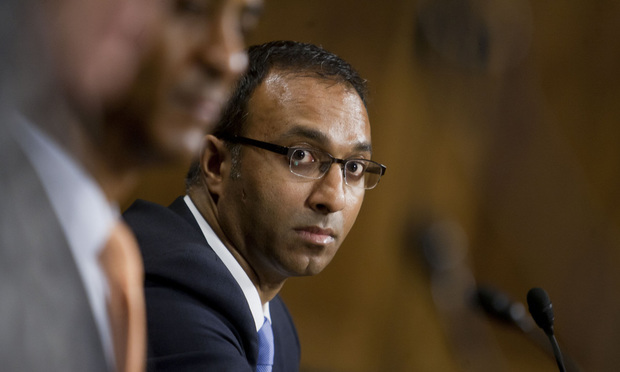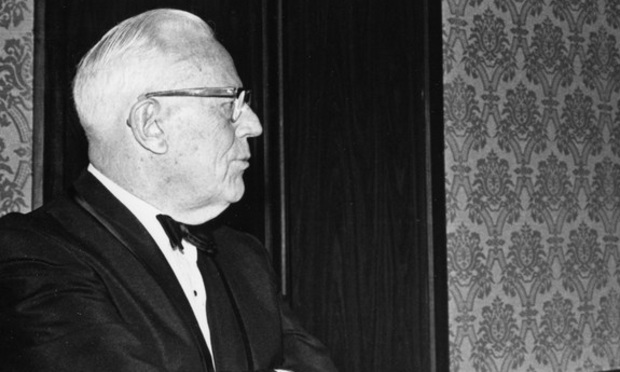2 Supreme Court Rulings Played Key Role in Subpoena Order Against Trump
Here's a look at two decades-old U.S. Supreme Court cases that were each cited more than a dozen times in U.S. District Judge Amit Mehta's ruling against Trump this week.
May 23, 2019 at 01:11 PM
6 minute read
 Amit Priyavadan Mehta during his Senate Judiciary Committee confirmation hearing to be U.S. district judge for the District of Columbia. September 17, 2014. (Photo: Diego M. Radzinschi/ALM)
Amit Priyavadan Mehta during his Senate Judiciary Committee confirmation hearing to be U.S. district judge for the District of Columbia. September 17, 2014. (Photo: Diego M. Radzinschi/ALM)
Two decades-old U.S. Supreme Court rulings played a central role in a Washington federal judge's decision this week supporting a congressional subpoena that seeks financial records from President Trump's accounting firm.
U.S. District Judge Amit Mehta's decision in Trump v. Committee on Oversight and Reform of the U.S. House of Representatives showed the continuing power of the high court's 1957 ruling in Watkins v. United States and its 1927 unanimous opinion in McGrain v. Daugherty.
Mehta's written ruling was the first-ever addressing a congressional subpoena seeking financial records from Trump, and the case will now move forward in the U.S. Court of Appeals for the D.C. Circuit, where the parties have asked for expedited review. Meanwhile, a Manhattan federal district judge on Wednesday dealt another setback for Trump, ruling from the bench that the president cannot block a House subpoena served on two financial institutions.
Mehta, who has served on the trial court since 2014, cited the McGrain case 18 times in his 41-page decision. In that case, Mally Daugherty challenged his contempt citation for failing to appear before a Senate committee investigating the alleged failure of his brother—former Attorney General Harry Daugherty—to arrest and prosecute those accused in the Teapot Dome scandal.
The Supreme Court was asked whether the Senate committee exceeded its authority when it issued the contempt order. The dispute questioned whether the investigation's purpose was related to the committee's legislative purpose. Justice Willis Van Devanter, writing for the court, said the committee had acted lawfully, and his ruling essentially established a presumption that congressional investigations have a legislative purpose.
“In actual legislative practice, power to secure needed information by such means has long been treated as an attribute of the power to legislate,” Van Devanter wrote. “It was so regarded in the British Parliament and in the colonial Legislatures before the American Revolution, and a like view has prevailed and been carried into effect in both houses of Congress and in most of the state Legislatures.”
In the Trump case, Mehta relied on Van Devanter's decision to bolster the foundation that Congress has broad investigative authority. Referring to Van Devanter's opinion, Mehta said the power to investigate is “deeply rooted in the nation's history.”
Federal courts, Mehta said, again quoting from the McGrain decision, must start with the assumption “that the action of the legislative body was with a legitimate object, if it is capable of being so construed, and the court has no right to assume that the contrary was intended.”
The Supreme Court's ruling in the McGrain case also made clear, Mehta said, that the absence of public statements identifying the investigation's purpose is not “conclusive proof of an invalid purpose.” The critical inquiry is not legislative certainty, but legislative potential, Mehta said. The McGrain ruling said that if the investigation's subject matter is “one on which legislation could be had,” then Congress is acting within its legislative function.
Mehta found that each of the four areas of investigation identified by the House committee is a subject “on which legislation could be had.”
 The late Chief Justice Earl Warren in 1972. (Photo courtesy of Marlene Trestman)
The late Chief Justice Earl Warren in 1972. (Photo courtesy of Marlene Trestman)The second Supreme Court case that Mehta relied on heavily, the Watkins ruling from 1957, stemmed from labor organizer John Watkins' refusal to give the House Committee on Un-American Activities information about individuals who had left the Communist Party. The Warren Court was asked if the committee's activities were an unconstitutional exercise of congressional power.
Chief Justice Earl Warren, in a 6-1 decision, concluded that Watkins' conviction was invalid under the Fifth Amendment due process clause because he was not given sufficient information and a fair opportunity to determine whether he was within his rights in refusing to answer. The Watkins decision held that Congress's legislative function has a related “informing function.”
Mehta, citing the opinion 16 times, rejected arguments from Trump's lawyers that the office of the president fell outside the scope of the power of Congress to inform. That function, Trump's lawyers said, was limited only to exposing government agency corruption, and the president is not an agency.
Watkins' reference to government agencies, Mehta wrote, is better understood as a case-specific statement and not a broad, limiting statement. “Plaintiffs' artificial line-drawing is antithetical to the checks and balances inherent in the Constitution's design,” Mehta said.
The Supreme Court has recognized that Congress' broad power to investigate does have limits.
There is not, Mehta wrote, quoting the Watkins ruling, a “congressional power to expose for the sake of exposure. The public is, of course, entitled to be informed concerning the workings of its government. That cannot be inflated into a general power to expose where the predominant result can only be an invasion of the private rights of individuals.”
Cornell Law School's Michael Dorf this week in a blog post looked at what he dubbed the “Watkins Test.”
“So long as a house or committee of Congress could seek information in connection with potential legislation (or in connection with some other valid congressional purpose), a court will not invalidate a congressional subpoena on the ground that one or more members of Congress sought the information for some illicit purpose,” Dorf wrote.
Mehta's ruling “should remain a slam-dunk for Congress, unless and until the Supreme Court chooses to repudiate the Watkins test,” Dorf said.
“But if it does, we will have an extreme incongruity, given the upholding of the Muslim travel ban in Trump v. Hawaii: The courts cannot take notice of the president's religious bias, even though he repeatedly stated it, but they can infer an illicit congressional motive to harass the president when a congressional committee subpoenas records that clearly bear on legitimate government business,” Dorf wrote in his post.
Read more:
DC Circuit Is Urged to Fast-Track Trump's Subpoena Appeal
US Judge Backs House Subpoena for Trump Financial Records
2 Amicus Briefs Played Big Roles in Latest 'Emoluments' Ruling Against Trump
Consovoy McCarthy Makes an Outsized Mark on Washington
In the 'Chaos': Stephen Boyd Is DOJ's Point Man as Democrats Dial Up Pressure
This content has been archived. It is available through our partners, LexisNexis® and Bloomberg Law.
To view this content, please continue to their sites.
Not a Lexis Subscriber?
Subscribe Now
Not a Bloomberg Law Subscriber?
Subscribe Now
NOT FOR REPRINT
© 2025 ALM Global, LLC, All Rights Reserved. Request academic re-use from www.copyright.com. All other uses, submit a request to [email protected]. For more information visit Asset & Logo Licensing.
You Might Like
View All
Dissenter Blasts 4th Circuit Majority Decision Upholding Meta's Section 230 Defense
5 minute read
Apple Files Appeal to DC Circuit Aiming to Intervene in Google Search Monopoly Case
3 minute read
DC Circuit Revives Firefighters' Religious Freedom Litigation in Facial Hair Policy Row
3 minute read
Judges Split Over Whether Indigent Prisoners Bringing Suit Must Each Pay Filing Fee
Trending Stories
- 1'Translate Across Disciplines': Paul Hastings’ New Tech Transactions Leader
- 2Milbank’s Revenue and Profits Surge Following Demand Increases Across the Board
- 3Fourth Quarter Growth in Demand and Worked Rates Coincided with Countercyclical Dip, New Report Indicates
- 4Public Notices/Calendars
- 5Monday Newspaper
Who Got The Work
J. Brugh Lower of Gibbons has entered an appearance for industrial equipment supplier Devco Corporation in a pending trademark infringement lawsuit. The suit, accusing the defendant of selling knock-off Graco products, was filed Dec. 18 in New Jersey District Court by Rivkin Radler on behalf of Graco Inc. and Graco Minnesota. The case, assigned to U.S. District Judge Zahid N. Quraishi, is 3:24-cv-11294, Graco Inc. et al v. Devco Corporation.
Who Got The Work
Rebecca Maller-Stein and Kent A. Yalowitz of Arnold & Porter Kaye Scholer have entered their appearances for Hanaco Venture Capital and its executives, Lior Prosor and David Frankel, in a pending securities lawsuit. The action, filed on Dec. 24 in New York Southern District Court by Zell, Aron & Co. on behalf of Goldeneye Advisors, accuses the defendants of negligently and fraudulently managing the plaintiff's $1 million investment. The case, assigned to U.S. District Judge Vernon S. Broderick, is 1:24-cv-09918, Goldeneye Advisors, LLC v. Hanaco Venture Capital, Ltd. et al.
Who Got The Work
Attorneys from A&O Shearman has stepped in as defense counsel for Toronto-Dominion Bank and other defendants in a pending securities class action. The suit, filed Dec. 11 in New York Southern District Court by Bleichmar Fonti & Auld, accuses the defendants of concealing the bank's 'pervasive' deficiencies in regards to its compliance with the Bank Secrecy Act and the quality of its anti-money laundering controls. The case, assigned to U.S. District Judge Arun Subramanian, is 1:24-cv-09445, Gonzalez v. The Toronto-Dominion Bank et al.
Who Got The Work
Crown Castle International, a Pennsylvania company providing shared communications infrastructure, has turned to Luke D. Wolf of Gordon Rees Scully Mansukhani to fend off a pending breach-of-contract lawsuit. The court action, filed Nov. 25 in Michigan Eastern District Court by Hooper Hathaway PC on behalf of The Town Residences LLC, accuses Crown Castle of failing to transfer approximately $30,000 in utility payments from T-Mobile in breach of a roof-top lease and assignment agreement. The case, assigned to U.S. District Judge Susan K. Declercq, is 2:24-cv-13131, The Town Residences LLC v. T-Mobile US, Inc. et al.
Who Got The Work
Wilfred P. Coronato and Daniel M. Schwartz of McCarter & English have stepped in as defense counsel to Electrolux Home Products Inc. in a pending product liability lawsuit. The court action, filed Nov. 26 in New York Eastern District Court by Poulos Lopiccolo PC and Nagel Rice LLP on behalf of David Stern, alleges that the defendant's refrigerators’ drawers and shelving repeatedly break and fall apart within months after purchase. The case, assigned to U.S. District Judge Joan M. Azrack, is 2:24-cv-08204, Stern v. Electrolux Home Products, Inc.
Featured Firms
Law Offices of Gary Martin Hays & Associates, P.C.
(470) 294-1674
Law Offices of Mark E. Salomone
(857) 444-6468
Smith & Hassler
(713) 739-1250








